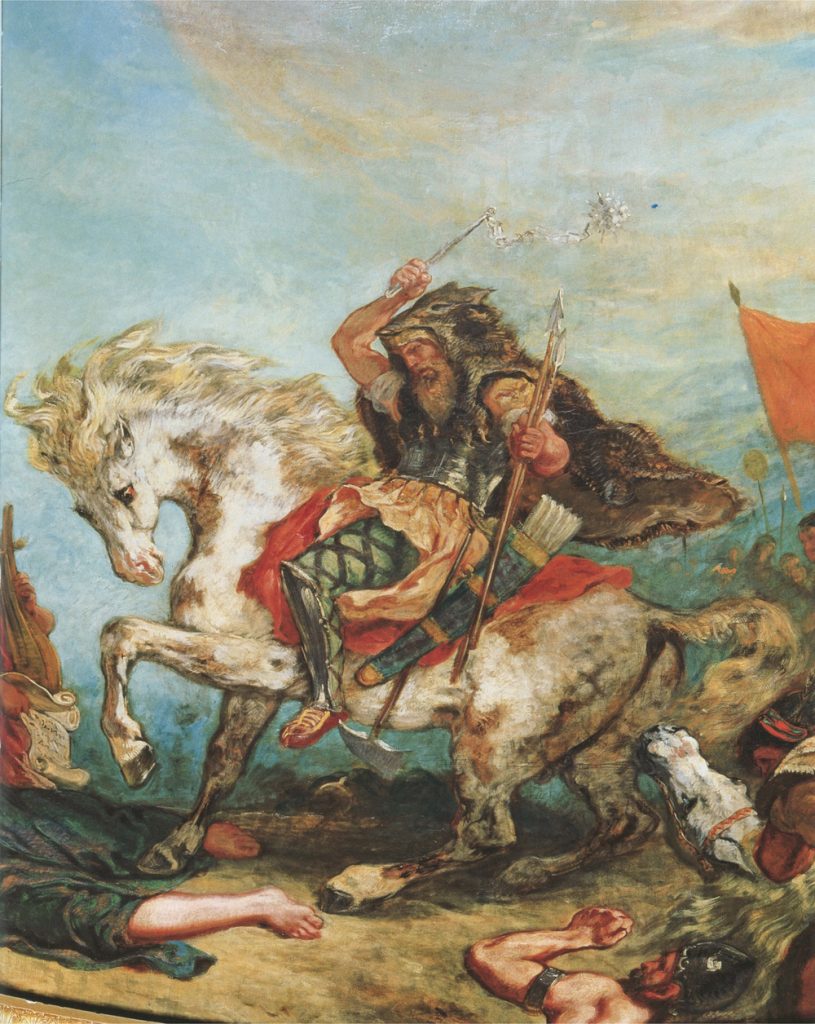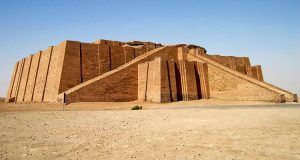There aren’t many people whose actions and life have brought astounding renown. In the case of those who have, their name, work, and stories have withstood the test of time. A lot of these people you may have heard of at some point in time, for example, Julius Caesar, one of Rome’s famous leaders. Of the many leaders and conquerors of history, there is one known as the “Scourge of God,” known for his ruthlessness, savagery, and barbaric acts, as he would overrun those who opposed him. And no, it is not Genghis Khan. Although they are somewhat similar, the “Scourge of God” came long before the famous Mongolian. The “Scourge of God” was the man Attila, leader of the Huns.
Born around 406 C.E. in Pannonia, in modern Hungary, Attila was the nephew of Rugila, King of the Huns. When Rugila died, around 435 C.E., Attila and his brother Bleda were appointed joint rulers.1 However, ten years later, Attila killed Bleda.2 No one knows exactly how or why Attila killed his brother, but many say it was on a hunting trip when an argument between the two might have escalated, and Attila, tired of sharing the throne, slew his brother. Attila was then in sole command of the Huns, and at this point he began his rampage across central Asia and into the Roman Empire, seeking to build his own empire.

The Romans were particularly concerned about the Huns, and rightly so, as the Huns were skilled warriors, primarily consisting of cavalry. After Attila’s uncle died and he took the mantle, he knew that he had to end the usage of the Hunnish people by the Romans. As a result of negotiating, the Romans had conceded to Hun demands and paid a tribute to the Huns! Attila expanded his empire at the expense of the Romans, raiding and plundering their cities as if he were some sort of pirate. He was known as the “Scourge of God” for his ferocious and cunning nature.3 But what exactly did they mean by the “Scourge of God?” The Romans thought that Attila’s invasions and attacks were an affliction or punishment from God, who was calling them to get right with Him. The Roman Empire had recently turned to Christianity, following the conversion of Emperor Constantine in the previous century. In the wake of Rome’s sack by the Visigoths in 410, Christian Rome was awash in apocalyptic interpretations of its plight. It is said that the Romans believed Attila to be one of the four horsemen of the apocalypse. The four horsemen are said to represent Conquest, Famine, Death, and War. At the time of Attila’s raids and expansion of his empire, the eastern Romans were also facing plagues and famines. Also during this period, the eastern Romans faced the effects of a fierce earthquake, which destroyed parts of their cities. The Roman people began to interpret these things as the beginning of the end as foretold in the Book of Revelations.4
Attila’s raids and the formation of the Hunnic Empire helped hasten the fall of the Roman Empire in its western half.5 You could imagine that the people of Rome became distressed at the fact that neither they nor their government could do anything to stop Attila. The scourge stomped his way into central Europe wreaking havoc and displaying his authority. Attila may have been seen as a warmonger to the people of Rome, but to his own people, he actually wasn’t so bad. He is said to have been a fair and generous leader with his people; he also didn’t impose taxes on them.6
The barbaric rage of Attila eventually slowed down when he invaded Gaul around 451 C.E. He was met by Roman general Flavius Aetius, who was aided by Visigoths under their king, Theodoric I. This led to Attila’s defeat in the great Battle of Chalons, from which he lost a great amount of men and was forced to retreat.7 Defeated, Attila and his forces had no other choice but to sit back and recover from the casualties from their last battle. Once they regained some of their strength, Attila decided to divert his focus to Italy, where he devastated some of its cities. When Attila came to Rome, it is noted that he had a meeting with Pope Leo (the Great), where the Pope was able to persuade him to spare them. Attila then led his armies out of Italy.8 It is thought that the “Scourge of God” supported the development of various stories about saints who protected their cities, in this case, somewhat boosting Pope Leo’s own favor.9
After his defeat at Chalons, and his sparing of Rome, Attila was no longer seen as intimidating as he once had been. He returned to the region of the lower Danube, where he apparently remarried. The “Scourge of God” was found dead in 453 C.E. in his bed after a party, where his newlywed wife also laid. There remains only speculations as to how Attila truly died, but he was mourned greatly by his people. Eventually, the confederation of tribes that Attila had brought together grew restless under the rule of Attila’s sons, and those tribes began to dispersed, ending the “Scourge” so dreaded by so many.10
- Salem Press Biographical Encyclopedia, January 2017, s.v. “Attila the Hun,” by John D. Windhausen. ↵
- Salem Press Biographical Encyclopedia, January 2017, s.v. “Attila the Hun,” by John D. Windhausen. ↵
- The Greenhaven Encyclopedia of Ancient Rome, 2002, s.v. “Attila” by Don Nardo. ↵
- Salem Press Biographical Encyclopedia, January 2017, s.v. “Attila the Hun,” by John D. Windhausen. ↵
- Salem Press Biographical Encyclopedia, January 2017, s.v. “Attila the Hun,” by John D. Windhausen. ↵
- Gale Encyclopedia of World History: Governments, 2008, s.v. “Hunnic Empire.” ↵
- Funk & Wagnalls New World Encyclopedia, 2016, s.v. “Atilla.” ↵
- The Greenhaven Encyclopedia of Ancient Rome, 2002, s.v. “Attila,” by Don Nardo. ↵
- Michael Whitby, “Attila the Hun, Barbarian Terror and the fall of the Roman Empire,” The Journal of Roman Studies, Vol. 100 (2010): 344. ↵
- Salem Press Biographical Encyclopedia, January 2017, s.v. “Attila the Hun,” by John D. Windhausen. ↵



32 comments
Elliot Avigael
Attila is one of my favorite historical figures, specifically for his military prowess and fierce brutality that you particularly emphasized very well in your article. Always fascinating as to how a few backwoods nomads can bring down even the mightiest of empires. Indeed he and the Great Khan are very similar (I’d love to see someone recreate a theoretical duel between Genghis Khan and AttilaP.
I knew the Huns originated somewhere near the Hungarian plain, but never exactly the precise location, so I appreciated the little detail you added in your article regarding that.
Overall, incredibly interesting article on an amazing military leader.
Roberto Rodriguez
It never really occurred to me, but I do not think I distinguished Attila the Hun from Genghis Khan in my mind. They both were really great military leaders, were feared by many and had accomplished many unique amazing feats, but for some reason I just clumped them together. It might just be because of how well they are known as warriors/leaders. I think it is note worthy that he put fear in the great civilization of Rome, that is not an easy task. I had no idea that he went by “Scourge of God”, but after reading this article it makes a lot of sense and he rightfully deserves that title.
Analisa Cervantes
I knew of Attila the Hun but not how he impacted history. I find it interesting how he got the name Scourge of God because of the tragedies befalling Rome at the time. I never knew he had a brother named Bleda. I find it sad that Attila killed his brother for mysterious reasons and took over the Huns completely.
Antonio Coffee
It was scary to imagine what Europe must have felt like at that time. Atilla was not a man to be messed with and it is easy to imagine why many people thought that it was a sign of the end times. Rome had not been this threatened since Hannibal was rampaging across Italy. Even then Atilla did something Hannibal never did, he forced Rome to give up some of there power.
Luke Lopez
This was a very interesting article on Atilla the Hun. Atilla and his brother, Bleda, were appointed joint rulers of the Huns, but Atilla killed Bleda ten years later. It is interesting that the Romans thought that Atilla the Hun was one of the four horsemen of the apocalypse. Overall, this article went into great detail in describing Atilla the Hun and how he was the “Scourge of God”.
Belene Cuellar
I wonder what was Attila’s motivation in conquering all of these lands. It is mentioned toward the end of the article that he remarried, but I never got much information about the first wife of his. Did she die or did he divorce her to be with his new wife? I’m honestly surprised that nobody ever tried to kill him or overthrow him.
Alexander Manibusan
This article is an amazing read! I really wonder how Pope Leo was able to persuade Attila. Like exactly what did he say to him that made him leave Italy? It must have been an extremely terrifying time- especially with everyone believing that the prophecies in Revelations were happening. Besides Hannibal, I’d say Attila the Hun was Rome’s worst nightmare.
Greyson Addicott
The East is well known for its ability to raise up great leaders. With figures like Attila still fresh in Europe’s mind, Genghis Khan would later emerge from the land of the rising sun to take on the idea of world domination once more. The two Eastern warlords certainly share some similar traits, but some of the most noticeable is their blood lust and endless determination. Attila surely smashed the Eastern Roman Empire, and is most definitely a great factor in its subsequent collapse. The perspective that this article gave on Attila was refreshing and enjoyable; Its focus on his enemies over his friends new and unique, and it left a lasting impression upon me as I scrolled to the bottom to leave this comment.
Christopher Hohman
Nice article. Attila is certainly one of those historic figures you would probably hate to meet on the side of the road. Just imagine how the people of the late Roman Empire must have lived in such fear of him. It is funny though that his own people’s view of him is quite different from the one the people of Rome had. They did not view him as a monster but as an actually good and generous ruler. Two sides to history there always is. His death sounds mysterious I wonder if he was murdered.
Esperanza Rojas
The topic itself is great and interesting but I was really interested in the way it was written. The beginning was wonderfully written, it captured my attention from the first sentence. It doesn’t have the stereotypical vibe to it of where it immediately mentions about the protagonist. The development of the story is also well composed for it holds enough mystery to reveal in the next paragraph and the character, Alittla, was very intriguing to see the growth from a brutal man to someone you sympathize with, and even though you see the harshness you can still see the goodness in him, which was displayed through the writing.